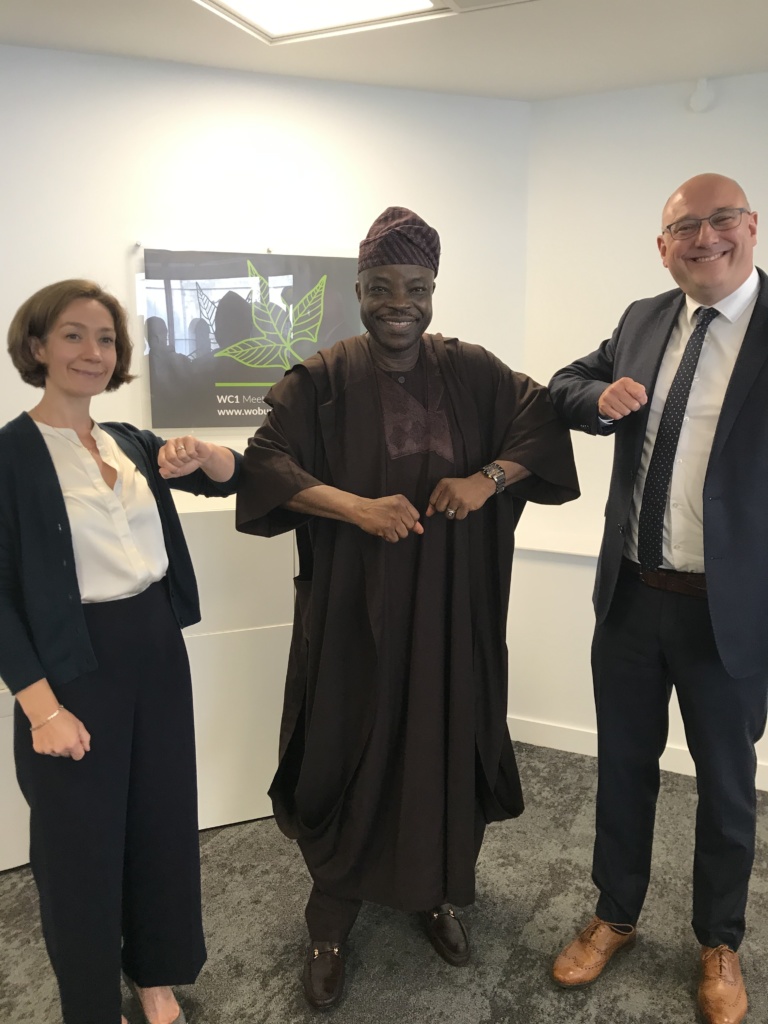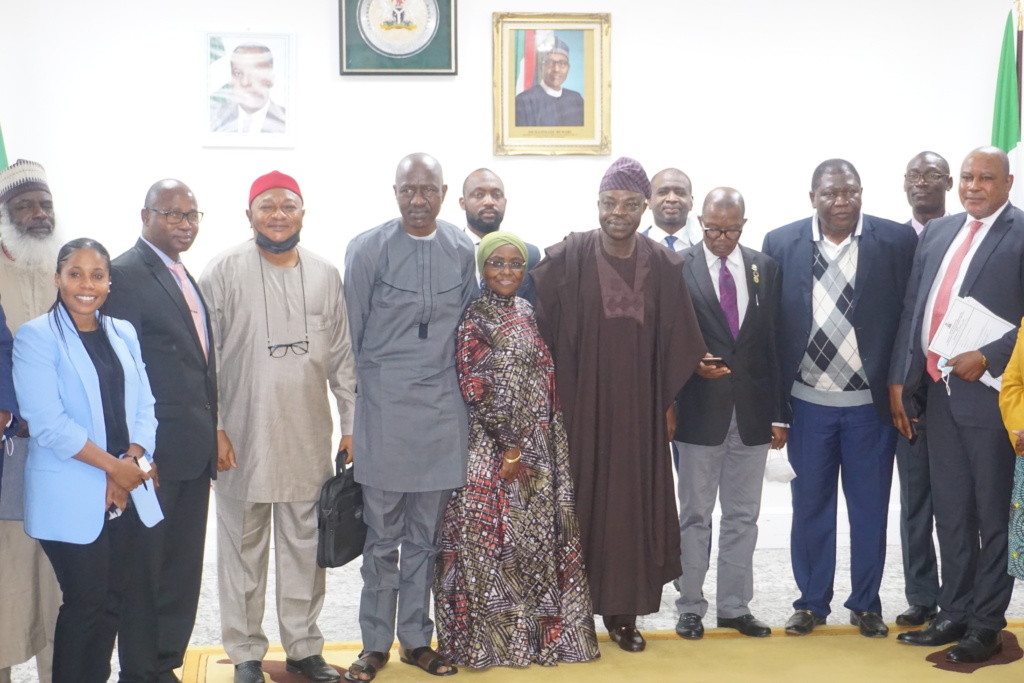
By Milton Tella – Africa requires a formidable representation in the UK in this post Brexit era. As Britain is making a new start away from the European Union, its interest is focused on Africa. Therefore, the African states must ensure that a formidable and knowledgeable diplomat represents its interest in the United Kingdom.
The new Nigeria High Commissioner in the UK, Ambassador Sarafa Isola, has exhibited the determination to serve his country in exceptional ways, especially in this fast changing global economy. Rubbing minds with a delegation of the Committee of Vice Chancellors of Nigerian Universities at the High Commission London, he spoke on how national challenges can be resolved through education.
The Committee of Vice Chancellors of Nigerian Universities, paid a courtesy visit to the High Commissioner at the Nigeria High Commission London on Thursday 1st July 2021.
His Excellency, Ambassador Isola while receiving the august visitors, used the opportunity to discuss issues affecting the quality of education in Nigeria. He urged the visitors, to play active roles in helping to resolve pressing economic and other national challenges in the country.
In order to make the visit to the UK by the Committee of Vice Chancellors of Nigerian Universities a meaningful and sustainable one, the High Commissioner facilitated a meeting with the Universities UK International to discuss areas of possible collaboration.
Ambassador Isola, called for the need for a peer review mechanism, where there are basis for comparison between Nigeria and UK universities. He said, “Emphasis must be placed on those things we can learn from each other.” He supported a proposed programme where students will spend three years in Nigerian University and one year in the UK to graduate.
The Ambassador said, “what we clearly need in our educational system in Nigeria today is a revolution. Our graduates of the past definitely are not the same as graduates of the present. Some people even say, we now produce more graduates that are unemployable. Sometimes our curriculum is designed to produce more graduates that we don’t need and less graduates that we need. All these have to be looked into by the Committee of Vice Chancellors.”
“For our country to develop, the manpower development rests on the tertiary institutions, it is so with developed countries of the world.
Ambassador Isola, while urging his visitors to be more involved in nation building, said, “I want you to lay much emphasis on those things that we need now. In our country as of today, food insecurity is an issue. We have two Universities of Agriculture, yet food importation is still very high. These are things that affect our foreign exchange, because a country that cannot grow what it eats is susceptible to food insecurity and some other issues.
“I strongly believe with the Committee of Vice Chancellors, some of these problems should be put on the table. The narrative should not just be restricted to how we manage our institutions; we should take interest in what happens in our country, because every decision that is taken at governmental level and at other macro level has direct consequences on what we do in the Universities. I want to seize the opportunity to plead with the Vice Chancellors to always take on every of our problems. Since you govern the citadel of learning, you should be in a position to propose various solutions to the mirage of the problems in the country.”
“There are no countries without its own challenges, even the UK has its own, but these challenges must be addressed from the institutions of higher learning, where we have some of the best brains. He asked the Vice Chancellors to rise up to address these challenges. He asked them “where are the Nigerian equivalents of Cambridge and where are our own equivalents of Oxford.”
Brain drain
On the issue of brain drain, Ambassador Isola said, “the world is a global village, and nobody should bother about brain drain. What l am concerned with is people getting educated in Nigeria at peanuts and going abroad without giving back.”
“The quality of the certificate from the University of Lagos for example, is comparable to some universities in the UK. The tuition fees for some of the courses like Pharmacy in Nigeria is 70, 000 naira per session compared to £18,000 in the UK.
It is time for Vice Chancellors to determine the cost of producing each graduate, as this is lost on many. The bills for the higher institutions of learning are more than what civil servants are paid. This is when we value some of these issues. There is no conscious effort to make people realise this cost implications. There is no conscious effort to even make it a policy as to what to give back to the society.”

The Nigeria High Commissioner to the UK, Ambassador Isola and the Ministers/Heads of Sections received the delegation consisting – Committee of Vice Chancellors of Nigerian Universities led by Prof. Yakubu Aboki Ochefu the Secretary General, Prof. Kabiru Bala Vice Chancellor Ahmadu Bello University Zaria, Egwunyenga Andy Ogochukwu Vice Chancellor Delta State University, Prof. Labode Popoola Vice Chancellor Osun State University Osogbo, Prof. Ganiyu Olatunji Vice Chancellor Olabisi Onabanjo University, Prof. Joshua Olalekan Ogunwole Vice Chancellor Bowen University Iwo, Osun State, Prof. Elijah Ayolabi Vice Chancellor Mountain Top University, Prof. Shehu Garki Ado Vice Chancellor Al Qalam University Katsina, Prof. Nosa Owens-Ibie Vice Chancellor Caleb University Lagos, Mrs Mosun Belo – Olusoga Pro – Chancellor Olabisi Onabanjo University Ogun State and Prof. Nwajiuba Uzoma Chinedum Immediate Past Vice Chancellor, Alex Ekwueme Federal University, Ndufu Alike Ebonyi State.
The High Commissioner led the delegation of Committee of Vice of Chancellors of Nigerian Universities to a follow-up meeting with Universities UK International (UUKI) at Woburn House, central London where discussions centred on collaboration of research, capacity building, sharing of best practices, blue economy and university governing models.
It was an opportunity for Vivienne Stern, Director, UUKI to highlight priority areas of collaboration for UK universities while Prof. Yakubu Ochefu, Secretary General, Committee of Vice of Chancellors of Nigerian Universities made a presentation on partnership and collaboration opportunities from Nigeria.
Among the delegation from the UUKI, were Prof. Richard Follett Deputy Pro Vice Chancellor, University of Sussex and Richard Grubb UUKI Senior Policy Officer, sub-Saharan Africa.
His Excellency, Ambassador Isola, in his closing remark, assured the gathering that the Education Section of the Nigeria High Commission, alongside the Nigerian University Commission, will ensure that the agreements and MoU emanating from the meeting will be carried out to the letter.
Ambassador Cyprian Heen Minister/Head of Trade & Investment, Paulinus Nwokoro Minister/Head of Consular, Education and Welfare, Osunnaiye Taiwo First Secretary, Yussuf Kankiya and Hajera Ibraheem both from the Nigerian University Commission Liaison Office London were on the delegation of His Excellency to the meeting between the representatives of the Universities UK International and Committee of Vice Chancellors of Nigerian Universities.
Kindly follow us on twitter:@AfricanVoice2









